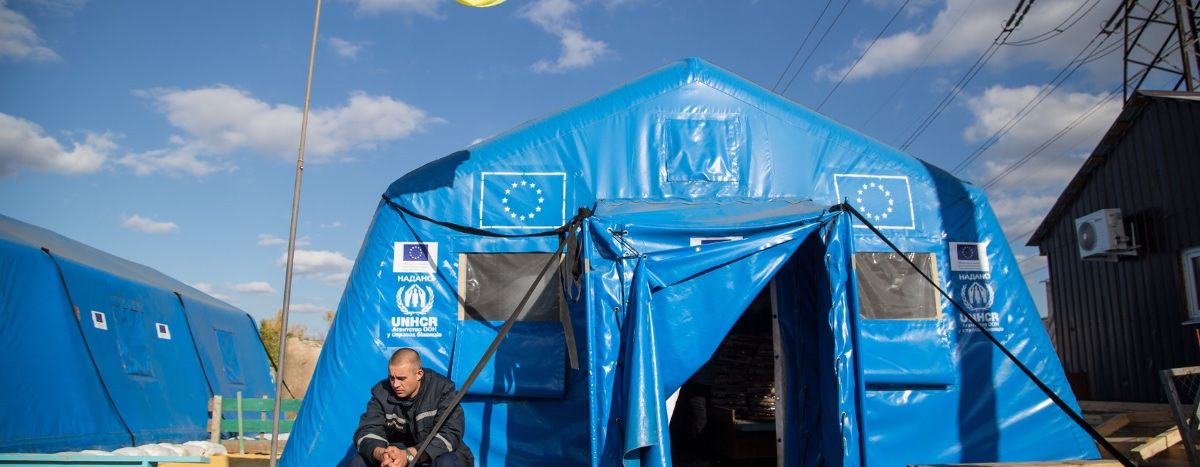
The ‘invisibilization risk’ of humanitarian aid
Published on
The war in Ukraine was an unprecedented moment of international solidarity across Europe and the entire world. Countless countries have sent humanitarian help, especially in the European Union. It confirms that humanitarian aid is, above all else, a political choice from the world's richest nations. And therefore, those wealthy nations can do more for the rest of the entire world. For our last essay of our GenerAction series, ONE Youth Ambassador Guillermo San Pro Blázquez warns that the conflict in Europe should not overshadow the needs of other countries.
The current instability around the world has provided a curious picture of the selective nature of country responses when addressing global challenges.
The most recent example is the imbalance between the enormous efforts put forth by the international community to assist Ukraine in its irrefutable time of need, and the response to African counterparts who are likewise suffering cycles of crises, including deadly conflicts, but have had to often plead their case time and again to receive even already agreed upon aid.
The emergence of new crises and the sustained nature of others leads to a phenomenon I like to call ‘invisibilization’, which materialises due to donor countries' short attention span and changing geopolitical and strategic priorities, leaving some crises in an endless cycle and others half-resolved.
The war in Ukraine has spurred a race to the top - a competition of sorts to see who is the most “charitable” country and thus, receives the most compliments. This attitude would likely not be criticised at all if it were the standard modus operandi in response to all serious global crises.
Bad precedents
Unfortunately, history (and the present) has shown us that double standards exist depending on the location or even the race of the people who are suffering.
One stark example is the 2011 food crisis that hit much of Africa, especially Somalia. According to a study published by the Food Security and Nutrition Analysis Unit, the late and ineffective response of aid agencies caused nearly a quarter of a million people to die, half of them children.
Though aid, in the form of emergency cash or voucher assistance, helped, it was not sufficient and not always properly implemented.
This trend of providing much needed aid, but falling short of targets, can likewise be seen on the institutional side when looking at development finance. Official Development Aid, or ODA is a commitment agreed to by governments and official agencies in the form of annual aid to lower-income countries.
It is time to meet funding commitments
The target is for each donor to reach 0.7 percent of their Gross National Income (GNI). However, this is far from being fully executed across the board. The total ODA allocated by members of the OECD’s Development Assistance Committee (DAC) was 0.33 percent of their combined Gross National Income .
Furthermore, if we take into account the ongoing impacts of the converging crises - conflict, climate change, food insecurity, weakened health systems - on low-income country budgets, which are already burdened by debt repayments, ODA is simply a drop in the bucket compared to the vast investments needed.
The Ukraine conflict has aggravated the already intensified inequalities stemming from the pandemic which could leave about 44 million people at risk of poverty, according to a study published by ONE.
Moreover, the destruction of entire cities has forced millions of people to leave their homes, and military tactics such as blockades have had major global consequences, increasing energy and food prices.
International aid is a matter of political will
The wide range of timely solutions implemented to support Ukraine, from sanctions to health and military assistance, indicate that complex transfer systems or agreements are not the true barriers to international aid. These do not cause delays or non-compliance, but rather a deduced lack of interest in putting an urgent end to the precarious situations suffered by Africans is likely the culprit.
If aid as a tool to achieve sustainable equity is not incentive enough to fully contribute, perhaps it is more compelling for donors to look at it from the business case, where the failure to provide assistance early-on only aggravates and entrenches the problem so that addressing it in the future, in terms of economic and health crises for example, is more costly.
It is understandable that at times of multiple crises, competing funding priorities emerge. However, international aid should not be cut from one challenge to be redirected to another, particularly when all are considered emergency situations.
This gradual invisibilization process, defining one crisis as no longer essential, on what can only be described as a whim since data doesn’t support the retraction of global resources, threatens, according to the NGO Oxfam to push almost a quarter of a billion people into extreme poverty.
A response is needed. We find ourselves in a moment that will define our generation.
If we want to live in an egalitarian society that cares for the common good, no distinctions should be made when it comes to providing aid and assistance to all necessary cases, because all continents bring synergies: the more protection and solidarity we offer, the greater the common benefits we obtain. The cost of inaction would be unforgivable.



